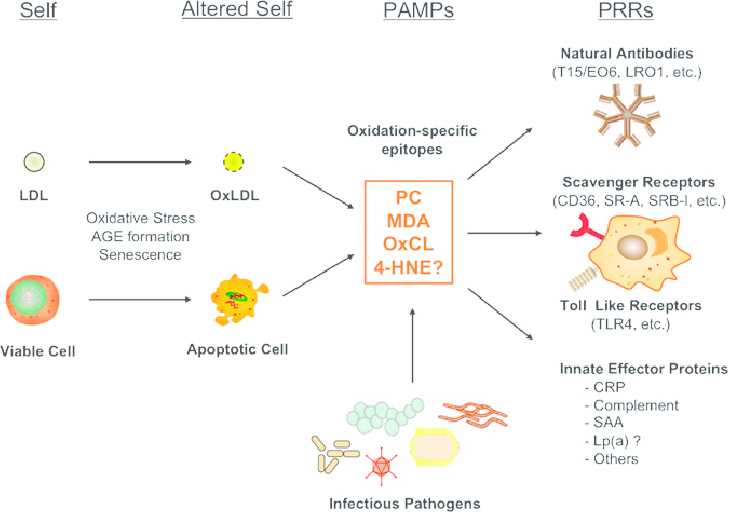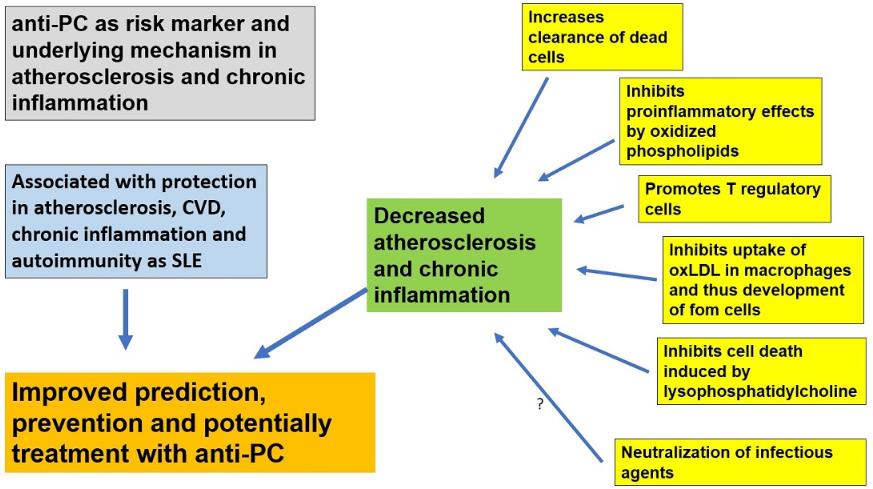NAA Services for Anti-Phosphorylcholine (PC) Antibody
Natural autoantibodies (NAAs) against phosphorylcholine (PC) are independently established risk factors associated negatively with the development of cardiovascular disease (CVD), including atherosclerosis and ischemic stroke. Creative Biolabs is the well-recognized expert in the field of diagnostic markers development and corresponding disease diagnosis. With years of experience and advanced platform, we can provide first-class autoantibody services against PC for atherosclerosis.
Background of Anti-phosphorylcholine (PC) Antibody
PC is one of the key epitopes found on oxidized low-density lipoprotein (ox-LDL) and apoptotic cells. Further studies have shown that anti-PC antibodies can aid in the clearance of these pro-inflammatory agents and even prevent the formation of foam cells. Anti-PC antibodies are generally subdivided into two populations based on their affinity for p-nitrophenyl phosphorylcholine (NPPC) and PC. Human anti-PC IgM, IgA, and IgG1 are Group I anti-PC antibodies, whereas anti-PC IgG2 is entirely made up of Group II antibodies. The serum levels of Group I anti-PC antibodies can be used to predict the progression of carotid intima-media thickness test (CIMT) in patients with hypertension. Many people present a substantial immune response to PC and anti-PC IgM antibodies have been reported to constitute 5-10% of the total IgM pool.
 Fig.1 Oxidation-specific epitopes are a class of pathogen-associated molecular patterns. (Hartvigsen, 2009)
Fig.1 Oxidation-specific epitopes are a class of pathogen-associated molecular patterns. (Hartvigsen, 2009)
The Role of Anti-phosphorylcholine (PC) Antibody in Atherosclerosis
Atherosclerosis, the major underlying cause of CVD, is chronic low-grade inflammation in the artery wall characterized by the accumulation of modified lipoproteins, dead cells and an abundance of activated immune cells that produce pro-inflammatory cytokines. It has been demonstrated that production of anti-PC antibodies accompanies the development of atherosclerosis. Group I anti-PC antibodies, particularly of the IgM class, are independent protection markers for atherosclerosis progression. Anti-PC IgM stands out as a stable biomarker candidate, which at very high levels is associated with a striking decrease in the likelihood of atherosclerosis progression. One possible novel biological explanation for this observation is that anti-PC IgM can inhibit lysophosphatidylcholine (LPC)-induced apoptosis and thus stabilize atherosclerotic plaques.
 Fig.2 Anti-PC antibodies lead to decreased atherosclerosis.2
Fig.2 Anti-PC antibodies lead to decreased atherosclerosis.2
What We Can Do about NAA?
We can provide comprehensive NAA services to cover every step of your program, from NAA detection and NAA profiling to NAA epitope mapping, based on our well-established platforms and experienced scientists. A wide spectrum of NAA products is available for your choice.
Since NAAs are known to contribute to the immune defense against a variety of microbial infections and anti-PC IgM is a protection marker for atherosclerosis, Creative Biolabs has a long interest in studying anti-PC antibodies with a focus on anti-inflammation in atherosclerosis. Equipped with years of experience and talented experts, Creative Biolabs is capable of providing a comprehensive set of services against PC marker for the diagnosis of atherosclerosis. Besides, we provide customized solutions to meet the requirements of every client. Please feel free to contact us for more information and a formal quote.
References
- Hartvigsen, Karsten, et al. "The role of innate immunity in atherogenesis1." Journal of lipid research 50 (2009): S388-S393.
- Frostegård, Johan. "Antibodies against Phosphorylcholine—Implications for Chronic Inflammatory Diseases." Metabolites 13.6 (2023): 720.

